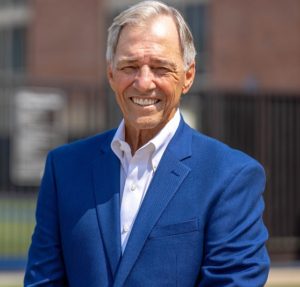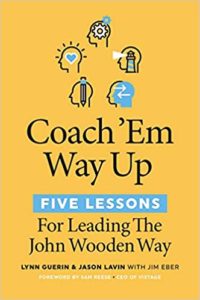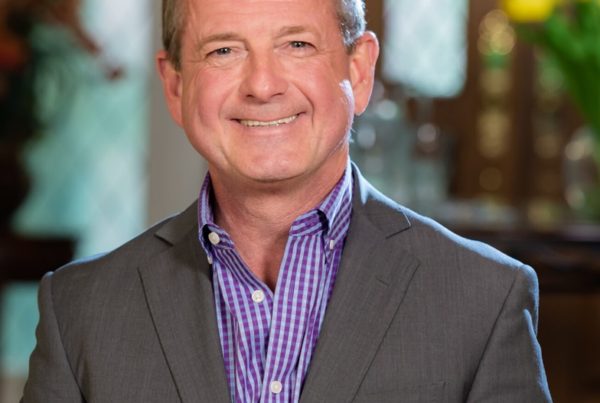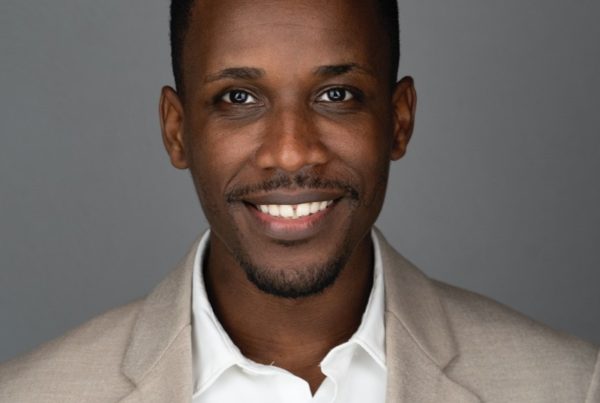Podcast: Play in new window | Download
Subscribe: RSS
How Can America Get Back Its A-Game?

Lynn Guerin
If America were an NCAA basketball team, we’d be looking at a 0-32 season. Employees are missing crucial shots as job worries spike to levels we haven’t seen in years. Our co-workers and communities have split into politically polarized shirts vs. skins, and as a result, we’re fouling out and fumbling mission-critical assists.
How can we get back our A-game and heal the country’s division?
The answer, says Lynn Guerin and his co-author Jason Lavin, is to unify our teams like legendary UCLA basketball coach John Wooden did. Wooden wasn’t only a record-breaking coach who won 38 straight NCAA tournaments and 10 championships in 12 short years. He was a beloved mentor and teacher, and his lessons are more relevant today than ever.
Lynn Guerin serves as CEO and Founder of The John R. Wooden Course and President and “Head Coach” of his family-owned coaching, training, and performance development firm, Guerin Marketing Services, working with many of America’s most successful organizations.
For the past 20 years, Mr. Guerin has had the unique privilege of partnering with legendary UCLA basketball coach John Wooden and the Wooden family in the development and delivery of the John R. Wooden Course. He and Jason Lavin co-authored the book, Coach ‘Em Way Up: 5 Lessons for Leading the John Wooden Way (Entrepreneur Press; November 17, 2020).
What We Discuss With Lynn Guerin in this Episode
- Principles that Coach John Wooden lived by
- John Wooden’s definition of success and how he applied it to life and basketball
- How to win within: defining success for yourself
- Why John Wooden never spoke about winning despite his winning track record
- The difference between a leader, a coach, and a mentor
- The structure and components of John Wooden’s pyramid of success
- Leadership and becoming an effective head coach of your own life
Episode Highlights
Who was John Wooden and what is the pyramid of success?
Coach John Wooden is considered America’s greatest coach. He served as a basketball coach at UCLA for 27 years. He was a high school basketball coach before that, and coached at Indiana State before that. He hadn’t coached a basketball game since 1975. His final game was a NCAA championship game, which he won – his tenth in twelve years. As a basketball coach, the run of success that he had is unequaled.
He was not only a great coach but also a great teacher of life. He was involved in the writing of eighteen (18) books in his 80’s and 90’s. He was literally coaching until his final breath.
I believe that John Wooden’s pyramid of success is the single most comprehensive blueprint of high value, high character, and high competence performance behavior ever constructed. I think Coach believed that it was his greatest contribution here on earth, as it can impact not only individual behavior but also families, organizations and communities. It is a blueprint for changing many of the problems in America today.
What was John Wooden’s definition of success?
Coach Wooden’s whole journey started when he was trying to understand the meaning of true success and how he could impart this to his students, parents, and players.
Webster’s definition of success is “the accumulation of material possessions or the attainment of a position of power or prestige.” That definition of success has been around for a long time and is still a centerpiece to most people’s definition of success.
According to Coach Wooden, the components of Webster’s definition of success are worthy achievements but are not indicators of success.
He thought about what his dad used to teach him: “Never try to be better than someone else but never cease to be the best you can be.”
He remembered this poem called “At God’s Footstool.” He loved poetry and actually had a Master’s degree in poetry.
At God’s footstool to confess,
A poor soul knelt and bowed his head.
“I failed,” he cried. The Master said,
“Thou didst thy best; that is success.”
That poem had a big impression on him. So he wrote his own definition of success:
“Success is peace of mind that comes with the self-satisfaction in knowing that you made the effort to do the best of which you are capable.”
So he had these four key components of success:
- Peace of mind: You are not successful if you do not have peace of mind. No pillow is more comfortable than a clear conscience. Peace of mind is so important.
- Self-satisfaction: Your ultimate success comes from how you feel about it. You only know deep down in your heart whether you gave it your best. There may be lots of ways that the world tells you that you’re successful, but ultimately you’re the one who really knows.
- Best Effort: This is the best effort you can bring every day.
- Capability: Your capability based on the gifts and talents that you have.
There are other aspects that can define or measure success which you can’t control. The best part about these four key components in John Wooden’s definition of success is that these four key components are things that you have control over.
John Wooden never taught about winning. Why?
John Wooden was involved in the writing of a children’s book called, Inch and Miles: The Journey to Success. In that book he wrote a little poem as a definition of success for children:
Success isn’t having trophies or toys
It isn’t a medal or friends of your choice
What is success, it’s easy to see
It’s trying to be the best that you can be.
Don’t worry what others might have or might say
When trying your best, success comes your way.
Getting children to understand that concept of success helps shape them in incredible ways.
One of the things that kids are caught up in today is this idea that they have to be a winner. It starts in little league. It starts at the lowest levels. The only thing that matters is the scoreboard at the end of the game. According to Coach Wooden, this is detrimental to children’s growth and their ability to really compete at the highest level.
So how did John Wooden win without talking about winning? He talked about all of the things it took to win but he never talked about winning or losing any time in his coaching career.
All the time in his coaching career, he never used the word ‘win’. The concepts of his teaching were about putting in the best effort, about focusing on the process it took to develop the fundamentals that ultimately enabled you to execute the game the best that it could be. He also believed in the value of preparation and the importance of the team, even saying that, “the star of the team is always the team.”
Coach Wooden coached his team like he coached his family and he thought of them in that same context. He talked about doing their best and being the best people they can be; being kind and being considerate.
He was also a day to day example of all of the blocks in the pyramid of success. He was exemplifying the behavior that it took to win. He never gave the “win one for the gipper” speeches. He didn’t believe in emotional peaks, because every emotional peak creates an emotional downfall. He was always trying to create that ever emerging level of excellence, being able to execute things better and better, and faster and faster under more challenging and more difficult conditions.
That’s why his team played in ten national championships and won all ten of them. The players had the ability never to be caught up in how big the moment was. They had been so prepared to handle that moment that they even felt the games seemed slow compared to their practices. These teachings enabled them to win without having to talk about winning.
What does it take for us to get our A-game back, based on what you learned from Coach Wooden and the importance of preparation?
Coach Wooden liked to say that failure to prepare is preparing to fail.
Regarding this swagger that we all think we need to have (nowadays), one of his favorite phrases was understanding the difference between character and reputation. Character is what you really are; reputation is just what you appear to be. People are so busy and worried about their reputation and how they appear to other people, they aren’t spending nearly enough time focusing on developing what it takes to become who they really are and the strong character they need to be the best they can be.
One of the 25 behaviors in Coach John Wooden’s Pyramid of Success is confidence. What is true confidence and where does it come from? It’s not a feeling, it’s not a swagger, and it’s not an image. Real confidence comes from real preparation and real work. It’s knowing that you did all that you could do to be prepared and to be the best that you could be.
Confidence comes from the hard work that you put in – the enthusiasm you show, the ability to be a good friend and a good teammate, and showing cooperation. It’s how much you are under control. It’s how alert and alive you are; how good you are at pursuing your goals. It’s how well conditioned you are. It’s how good a team player you are. If those things are in place, you can be confident and prepared.
On Coach Wooden’s pyramid, right beside confidence is a block called poise, which Coach Wooden defines as just being yourself. If you’ve gone through all this hard work and preparation, and you’ve done your best, you can be poised and feel good about being yourself and it will lead you to become truly confident.
How is John Wooden’s Pyramid of Success structured?
I’ve spent 20 years now, analyzing, learning and understanding John Wooden’s Pyramid of Success. It turns you into a student of human performance behavior and the psychology behind all that.
Coach Wooden took the best idea he had and he spent the next fourteen years working on that idea to come up with the pyramid of success; something he could put on one page.
He tried to identify every single one of these behaviors, and not just whether these behaviors should be part of this attainment of true success, but exactly where these blocks fit in relationship to each other. That’s where I believe the science and magic of John Wooden’s pyramid all comes together.
You really can learn from every block. For example, his block “Industriousness” is where he started. It was a cornerstone. The other cornerstone is enthusiasm. How do those two things go together? The word “Industriousness” helps to define the idea of very productive work that produces very tangible results – results that you can see. He put the two elements together – the level of effort you bring and the quality of the planning that’s involved in doing the work. There’s a lot that can be accomplished if we do a little bit of planning every day to get that work done. That’s one of the things he was absolutely brilliant at – how he organized his time and every tasks, how he planned to get things done, and how he carried out his plan.
So he built this Pyramid of Success from the bottom up. He talked about the first five behaviors and being the foundation: Industriousness, Enthusiasm, Friendship, Loyalty and Cooperation.
Industriousness and enthusiasm go together because as Coach Wooden would say, “You can never do your best work unless you love what you do.” When someone is enthusiastic about what they are doing, there’s a better chance that there will be a higher level of effort to the industriousness I’m trying to accomplish.
The first two blocks (Industriousness and Enthusiasm) relate to us individuals. The next three blocks, (friendship, loyalty, cooperation) add others. Those can only happen with more than one person involved.
What’s the relationship between industriousness and why it is next to friendship? How hard is it to have good friends? How hard do you have to work make friendship flourish?
What’s the relationship between friendship and loyalty? Are people more likely to be more loyal to people they have friendships with or have good relationships with? They are.
The relationship between loyalty and cooperation: Are people who are more loyal to each other more likely to cooperate better with each other?
So you can take every block and show the relationships.
Lynn Guerin’s journey with John Wooden.
Part of my early involvement was because John Wooden was the father, the grandfather and the great grandfather that I never had. So part of my journey with him is so personal and emotional. I was a third generation abandoned son. We didn’t have fathers raising their family for over 100 years. One of my goals in life was to break that chain of abandonment, which I’ve been able to do with my two boys and my grandsons.
So when I had the privilege to work with Coach John Wooden, he was everything I could ever had imagined a father, grandfather, teacher, coach and mentor could ever be. That’s why he was so transformative in my life.
He was a high character and high values guy. That wasn’t me. I’m the last guy on the planet that ought to be teaching this. I’m a low character guy trying to be a high character guy, and learn how to be a high character guy, so I can help others who want who are on that very same journey. Everybody needs a coach. Everybody needs a mentor. Everybody needs a role model. We have all that responsibility to teach, coach, love and serve. That was Coach Wooden’s life was all about.
What is the difference between a leader, coach, and mentor?
We try to frame that very specifically in our book. I think it’s really an evolution culturally, and in business and communities. We grew up thinking it was all about leadership, and the model was primarily top down leadership. The leader is up there somewhere and everybody else is down here. So there was this hierarchical relationship.
But there’s a lot of skepticism about leaders these days, at every level. Particularly young people are very skeptical about the idea of leadership. That’s why we believe that the top of the standard today is really about being a head coach. All great coaches are good leaders. But not all good leaders are great coaches. We think there’s a higher level of requirement to be a great coach because it encompasses leadership and mentorship.
It starts with the quality of your thinking. If you’re going to be a good coach, that can only come out of the quality of your thinking, the values that shape your thinking, and the primary inputs that are providing all the assets and resources for good thinking. So we spend a lot of time in the book challenging you to think about your thinking.
Everything we’re feeling and everything we do starts with the way that we’re thinking every day. Getting your head right is really the beginning of the process.
John Wooden spent his whole life as a lifelong learner. There was a principle his dad gave him in something called the 7-Point Creed, when he was about to graduate from junior high. It was, “Drink deeply from good books.” His dad, as a man of faith said, “especially the Bible.”
What he was saying to his son was, make sure everything you put in your mind is worthwhile. We live in a world today where we are bombarded with a lot of stuff that is absolutely useless and worthless for our day to day thinking, to help shape us to be the kind of people and community that we want to be and need to be.
So much of the problems around the racial issues today are so confused by the stereotypes and distorted thinking and views that people have about each other and their cultures. The less we know about each other, the worse it is. The more we know, the more we learn about each other and share each other’s lives, the more we can understand each other. One of the reasons why we’re not learning anything is because nobody is listening.
In Coach Wooden’s definition of Cooperation he has the phrase, “listen if you want to be heard.” Be more interested in finding the best way than having your own way. Today nobody wants to listen and everybody wants their own way, so you wonder why nobody cooperates with each other!
It sounds simple but very deep and very profound.
Final Thoughts…
I think a lot of the things we think we need to discover, we already know. Our country, our community, and our schools were built on solid foundations but we’re losing sight on all of those things; the things on which John Wooden built his life.
There’s no such thing as failure. The only true failure is the failure to do things when they need to be done. It’s only an opportunity to learn and grow, and through adversity, it’s the only way we develop strength. We have the strength, knowledge, values, and understanding. We don’t have to go out to search for a new blueprint to make America great again. We know what the formula is, we just need to return to some of those foundations and fundamentals.
Become an effective head coach of your own life. Be good to yourself – promote yourself to this position of head coach of your own life. There is no one more capable of holding that position than you are. No one has more at stake than you do. Be the best head coach of your life and if you do a pretty good job on that then you’ll have the privilege, responsibility, and the opportunity to coach others.
Most of our success comes down to how well we coach ourselves, but most of the joy we will have is how well we serve others.
“A Little Fellow Follows Me” By Rev. Claude Wisdom White, Sr.
A careful man I want to be,
A little fellow follows me;
I do not dare to go astray,
For fear he’ll go the self-same way.
I cannot once escape his eyes,
Whate’er he sees me do, he tries;
Like me he says he’s going to be,
This little fellow who follows me.
He thinks that I am good and fine,
Believes in every word of mine;
The base in me he must not see,
This little fellow who follows me.
I must remember as I go,
Through summer’s sun and winter’s snow;
I am building for the years to be
This little fellow who follows me.
Episode Resources 
- Book: Coach ‘Em Way Up: 5 Lessons for Leading the John Wooden Way by Lynn Guerin & Jason Lavin with Jim Eber
- Online Assessment: Receive a 50% off code when you buy the book
- Children’s Book: Inch and Miles: The Journey to Success by Coach John Wooden
Connect with Lynn Guerin
- Book Website: coachemwayup.com
- Course Website: https://www.thejohnrwoodencourse.com
- Facebook: https://www.facebook.com/JohnRWoodenCourse
- Twitter: https://twitter.com/woodencourse
- LinkedIn: https://www.linkedin.com/company/john-r.-wooden-course
- Instagram: https://www.instagram.com/woodencourse
Did You Enjoy The Podcast?
If you enjoyed this episode please let us know! 5-star reviews for the Leaders Of Transformation podcast on Apple Podcasts, Spotify, Pandora or Stitcher are greatly appreciated. This helps us reach more purpose-driven entrepreneurs seeking to make a positive impact in the world. Thank you. Together, we make a difference!
Additional Episodes You May Like
- 372: Techno-Resiliency and the Mandate To Be Great with Dr. Rob Graham
- 370: Transforming New Leader Development with Thomas Kolditz
- 349: Michele Sullivan: Looking Up, Turning Obstacles into Advantages
- 307: Matthew Young: Creating Quality Experiences at the Youth Sports Level
- 297: Craig Wheldon: Life and Leadership Lessons From A 2-Star General










